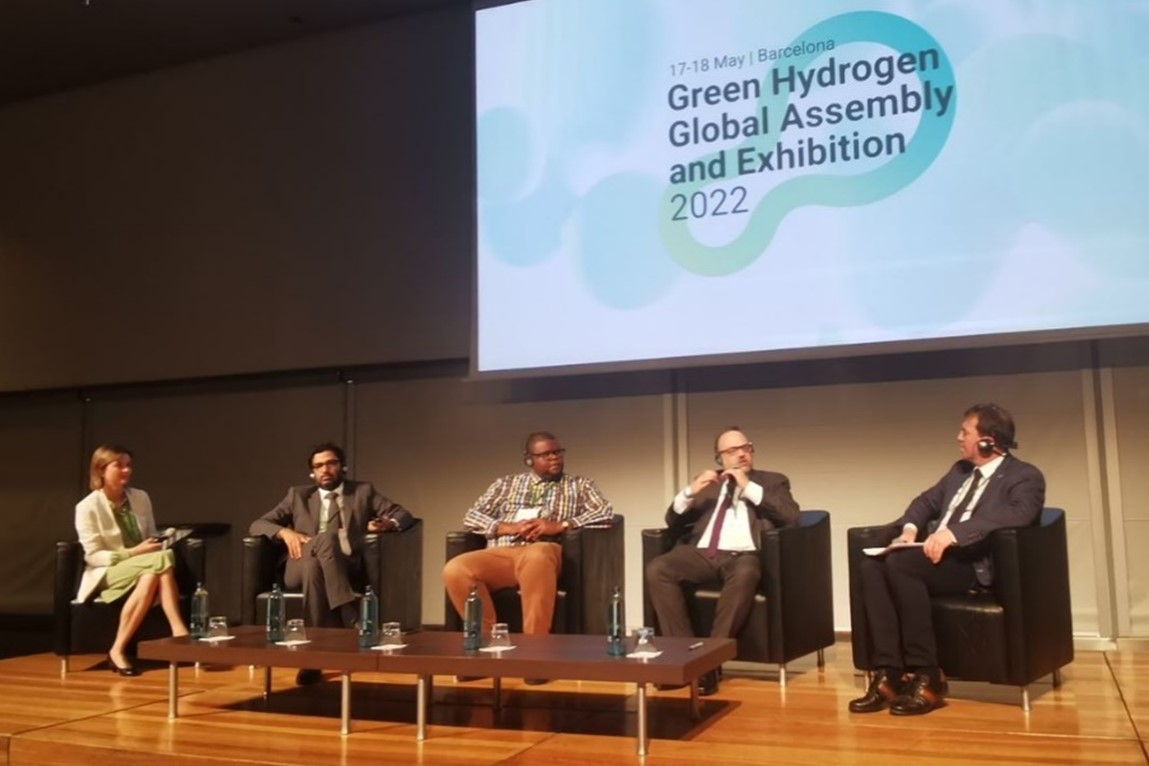Unlike fossil fuels, green hydrogen can be produced virtually anywhere. Some of the best conditions to produce green hydrogen cheaply are in fact located in the “Global South”. This offers unprecedented opportunities for developing countries and emerging markets – to not only build a net-zero economy at the domestic level but also to contribute to the achievement of global climate goals by exporting surplus hydrogen and derivatives to other regions, such as Germany. However, the development of this new technology does not come without risks and challenges. To shed light on the associated opportunities and pitfalls, GIZ organised a session with high-level representatives from Chile, Argentina, South Africa, India and Germany on 17 May 2022 at the GH2 Global Assembly in Barcelona.
Main takeaways
1. The political will to develop green hydrogen is already there. Representatives from Chile, Argentina, South Africa and India alike reiterated the political ambition and ample potential of their countries for developing large-scale production of green hydrogen, reflected in national targets and strategy papers.
2. A long-term strategy is needed. Strategically defining the role of green hydrogen in national development and climate plans is key. In particular, hydrogen exports and domestic development and decarbonisation should go hand in hand. While exports are best placed to absorb the price premium on green hydrogen in the short-term, this should be used as a vehicle to support domestic value chains and decarbonise local sectors.
3. Opportunities for increased energy security everywhere exist. The energy supply issues caused by the geopolitical disruptions due to the war in Ukraine and increased short-term energy demand from Europe have caused the ramp-up of large-scale green hydrogen projects to accelerate. In this context, panellists pointed out that the development of green hydrogen has the potential to contribute to energy security in both producing and importing countries. While in Germany the transition from importing natural gas to green hydrogen will allow to diversify energy supplies, positively affecting energy security, green hydrogen is also front and centre in India’s search for energy independence as national demand grows.
4. Demand side is a critical bottleneck. In transitioning to the feasibility stage, security of demand is needed to ensure commercial viability for private sector-led projects. To ensure this, the government is expected to play a supporting and convening role by providing the funding required to make this leap. Panellists stressed the need for long term contracts to make projects viable and, in this regard, the German instrument “H2 Global” was praised for offering secured offtake. In addition, the role of existing industrial clusters in emerging economies was mentioned as an opportunity for scale up of domestic demand for green hydrogen, making the transition of projects from grey to green hydrogen in the near-term possible.
5. There is a need for closer global cooperation. The need to cooperate with global partners to enable future imports was emphasised. However, cooperation should follow sustainability criteria, include country-specific approaches and engage civil society in the process. The need for more international exchange and alignment in terms of standards for green hydrogen, model contracts for purchasing agreements and acceleration of technology developments was also highlighted. More direct partnerships with countries of demand at the government level, including creating conducive business environments, will also be crucial for countries looking to export hydrogen.
A recording of the event is available here.
Participants
Keynote
- Claudio Huepe, Minister of Energy, Chile
Panel
- Dr. Matías Kulfas, Minister of Productive Development, Argentina
- Masopha Moshoeshoe, Investment and Infrastructure Office of the South African Presidency
- Vikram Kapur, President and Chief Growth Officer, ReNew Power
- Elisabeth Taher, Advisor at Ministry for Economic Affairs and Climate, Germany
Moderator
- Mike Enskat, Head of Energy and Infrastructure, GIZ
